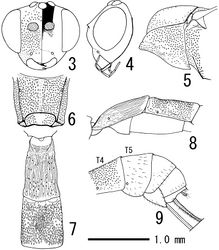Difference between revisions of "Himertosoma"
m (Imported from ZooKeys) |
m (1 revision) |
(No difference)
| |
Latest revision as of 15:20, 30 October 2012
| Notice: | This page is derived from the original publication listed below, whose author(s) should always be credited. Further contributors may edit and improve the content of this page and, consequently, need to be credited as well (see page history). Any assessment of factual correctness requires a careful review of the original article as well as of subsequent contributions.
If you are uncertain whether your planned contribution is correct or not, we suggest that you use the associated discussion page instead of editing the page directly. This page should be cited as follows (rationale):
Citation formats to copy and paste
BibTeX: @article{Watanabe2012ZooKeys234, RIS/ Endnote: TY - JOUR Wikipedia/ Citizendium: <ref name="Watanabe2012ZooKeys234">{{Citation See also the citation download page at the journal. |
Ordo: Hymenoptera
Familia: Ichneumonidae
Name
Himertosoma Schmiedeknecht, 1900 – Wikispecies link – Pensoft Profile
- HimertosomaYu and Horstmann (1997) for synonymy.
Remarks
According to Townes (1970)[1] and Chandra and Gupta (1977)[2], this genus can be separated from other atrophine genera by the combination of the following character states: occipital carina complete, its lower end joining hypostomal carina; mesoscutum often smooth; areolet always absent; tarsal claws sometimes only partly pectinate; first metasomal tergite covered with longitudinal striation, with more or less distinct median dorsal carina basally, spiracle in front of middle (Figs 7, 8); laterotergite of fifth metasomal tergite not separated by a crease; exposed portion of fifth metasomal tergite of female only about 0.5 times as long as exposed portion of fourth metasomal tergite; and ovipositor distinctly longer than hind tibia (more than 1.4 times as long as hind tibia). However, the classification of Himertosoma and its most similar genus, Lissonota Gravenhorst, is still in dispute; Himertosoma can be separated from Lissonota only by a single character, the absence of the crease separating laterotergite of the fifth metasomal tergite. Their generic status should be reconsidered in future study.
The genus Himertosoma, hitherto known only from the Philippines in the Oriental Region (Chandra and Gupta 1977[2]), was discovered for the first time on Amamioshima Island, the North Ryukyus, represented by the following new species.
Taxon Treatment
- Watanabe, K; Maeto, K; 2012: A new species of the genus Himertosoma from the Ryukyus, Japan, with a key to species from the Palaearctic and Oriental Regions (Hymenoptera, Ichneumonidae, Banchinae) ZooKeys, 234: 59-66. doi
Other References
- ↑ Townes H (1970) The genera of Ichneumonidae, part 3. Memoirs of the American Entomological Institute 13: 1-307.
- ↑ 2.0 2.1 Chandra G, Gupta V (1977) Ichenumonologia Orientalis, VII. The tribes Lissonontini & Banchini. Oriental Insects Monograph 7: 1-290.
Images
|
